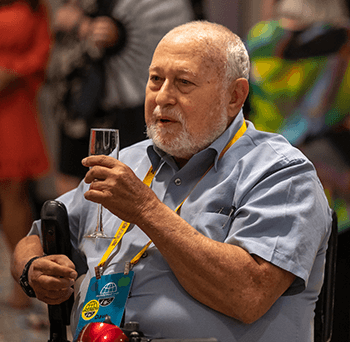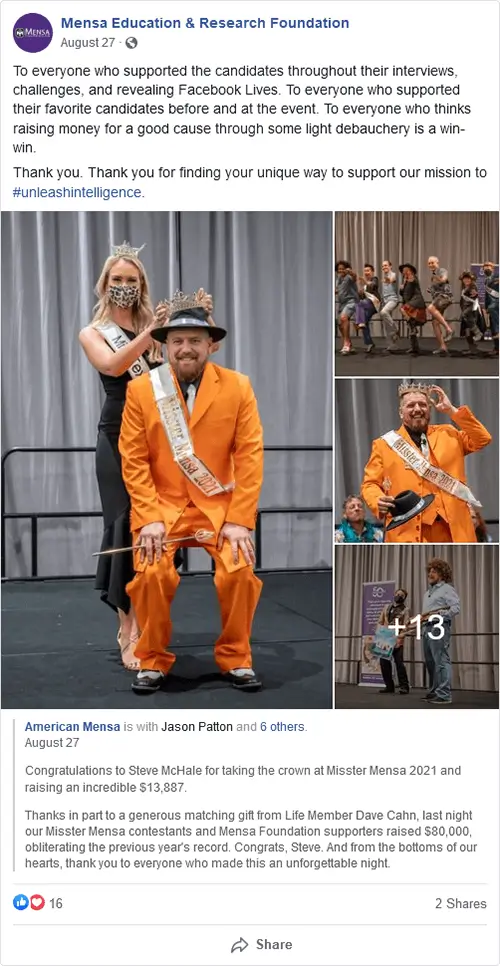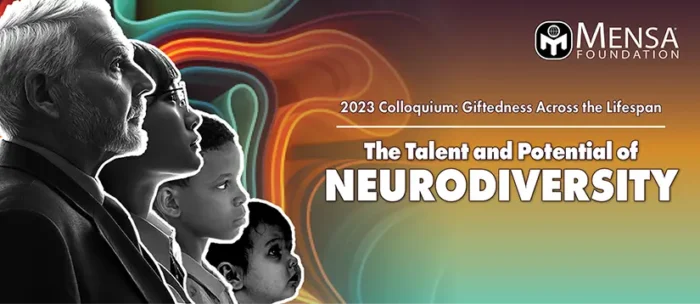
“Why don’t you do it while you’re still alive?” That’s what my daughter Lisa asked me after I told her I was thinking of adding a substantial bequest to the Mensa Foundation to my will.
She noted that I would then have the pleasure of seeing my donation do some good in the world. Besides, she would not know what I wanted the gift to accomplish, and it would be better if I could work that out with the Foundation. Smart daughter (Mensa caliber).
So, I took her advice and contacted the Foundation (which I still fondly think of as MERF). In my discussions to arrange the gift, I got to thinking that I would like to see if I could leverage my donation to encourage others to give more at the same time. Thus was born my offer to match all donations to this year’s Misster Mensa competition up to $50,000, effectively doubling each member’s impact. Because time was short, we extended that offer after the AG to include all donations through the end of August. The results were awesome! In addition to my donation, the membership stepped up and donated $56,600 during that period, the highest total ever raised for that competition. Thanks to all who donated.

I am not a wealthy person, or at least I never thought of myself as one, so how did I get even to consider what to me seems even now to be a large donation? Earlier this year I took stock (pardon the pun) of my major financial assets and discovered to my delight that it looked like I finally had enough to live out my life without becoming a burden to my family. Of course, I could surprise them and outlive the life expectancy tables, but that’s a problem I hope I will have to deal with. Because much of my money is in tax-deferred IRAs and similar accounts, there are also tax advantages of making a charitable rollover.
I had to consider that any donation, now or in my will, would decrease the money left to Lisa and my other children. I wouldn’t feel a thing either way. She assured me that they weren’t expecting anything and that she knew Mensa meant a lot to me.
Mensa does mean a lot to me. It has been a big part of my life for nearly 50 years. When I found Mensa, I found my tribe. I really “belonged” for the first time in my life, and I wanted to give something back. The Mensa Foundation was the way to do that.
The Constitution of Mensa tells us that the purposes of Mensa are:
- to identify and foster human intelligence for the benefit of humanity;
- to encourage research into the nature, characteristics, and uses of intelligence; and
- to provide a stimulating intellectual and social environment for its members.
Mensa itself takes care of only number 3. The Mensa Foundation fulfills the first two purposes. Yes, it’s great going to parties and gatherings, participating in SIGs, and even volunteering in various ways. Mensa gives us the chance to interact socially with other highly intelligent people and be our authentic selves with no holding back. That’s the fun side of Mensa. It’s valuable to us, but frivolous as far as the rest of the world is concerned. It looks inward.
The Foundation, on the other hand, looks outward. It is our window on the world. It has an impact beyond ourselves. Its scholarships, fellowships, research grants, gifted youth programs, and other activities really make a difference.
That’s what I want to do: make a difference.
That’s why I made a major donation to the Mensa Foundation during my lifetime. I’m still discussing with the Foundation the best use for my gift, and I’m looking forward to seeing it grow and do some good in the world.
I hope more Mensans will join me in contributing to the Foundation. With more funds, it can do more to unleash intelligence, put it to use “for the benefit of humanity” and, I hope, contribute to the image of Mensa as a force for good in the world.










Comments (0)